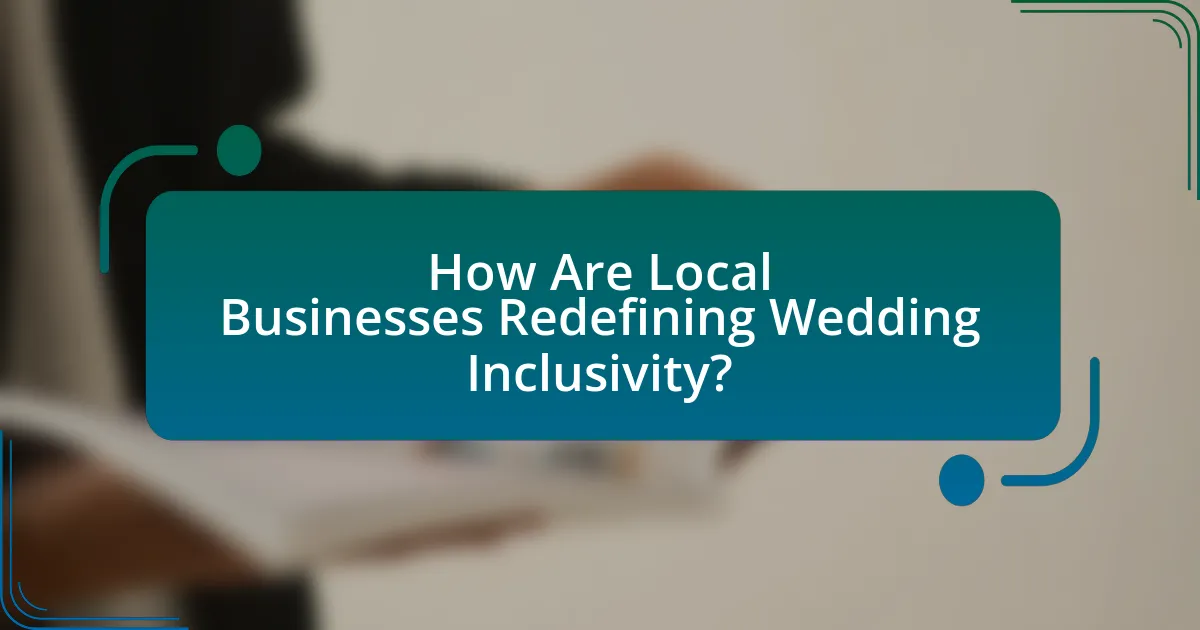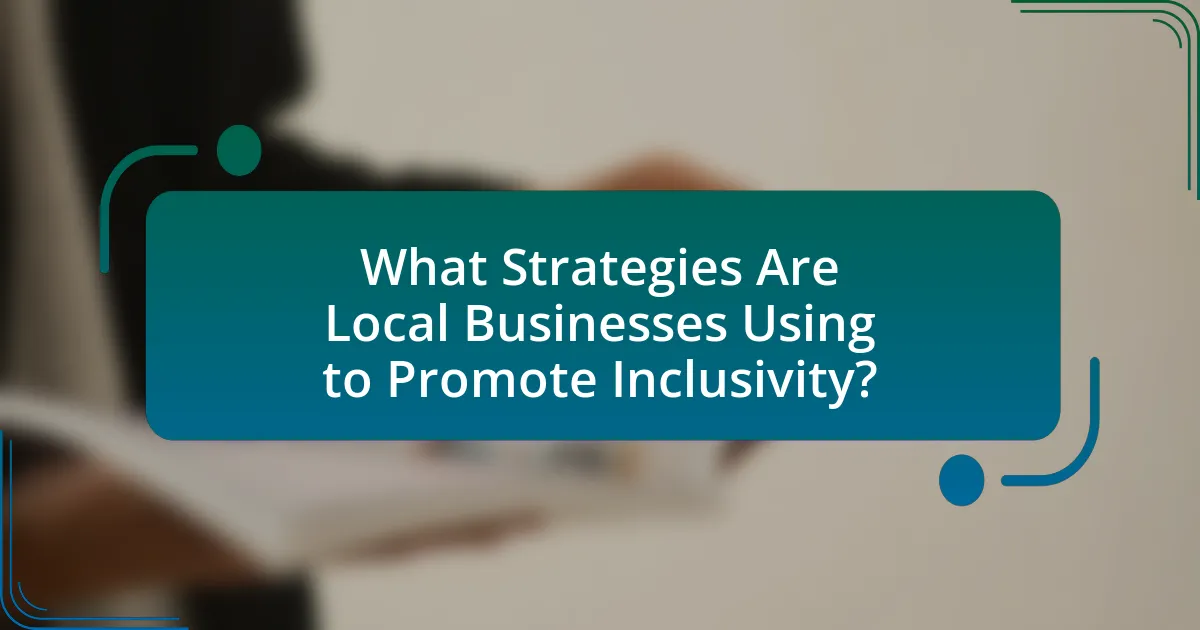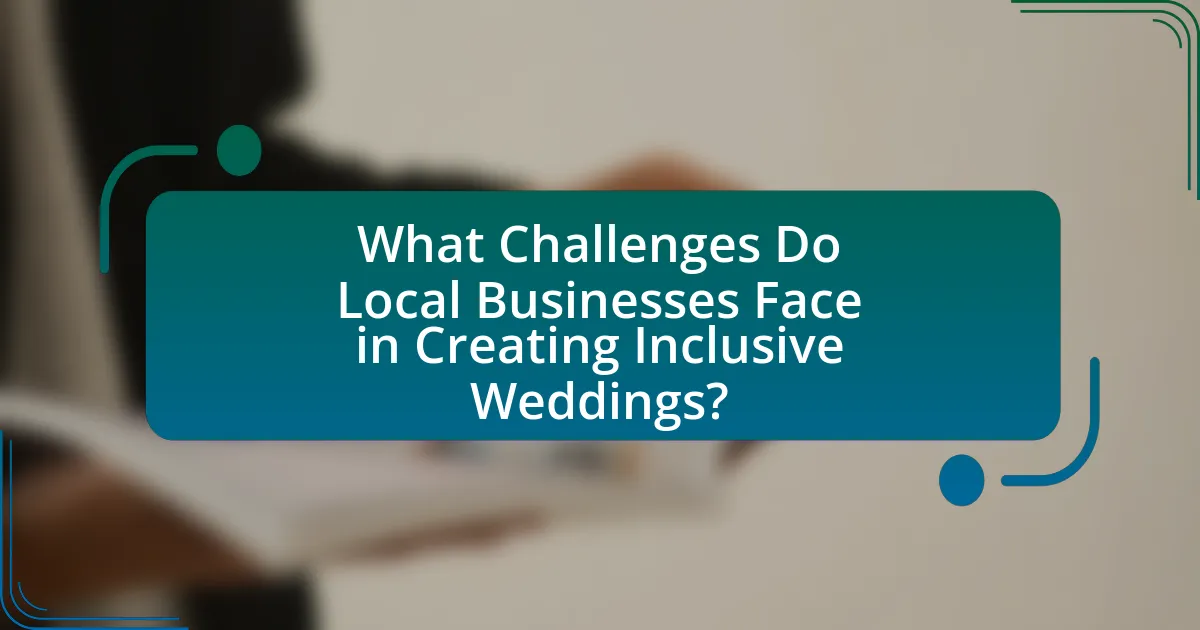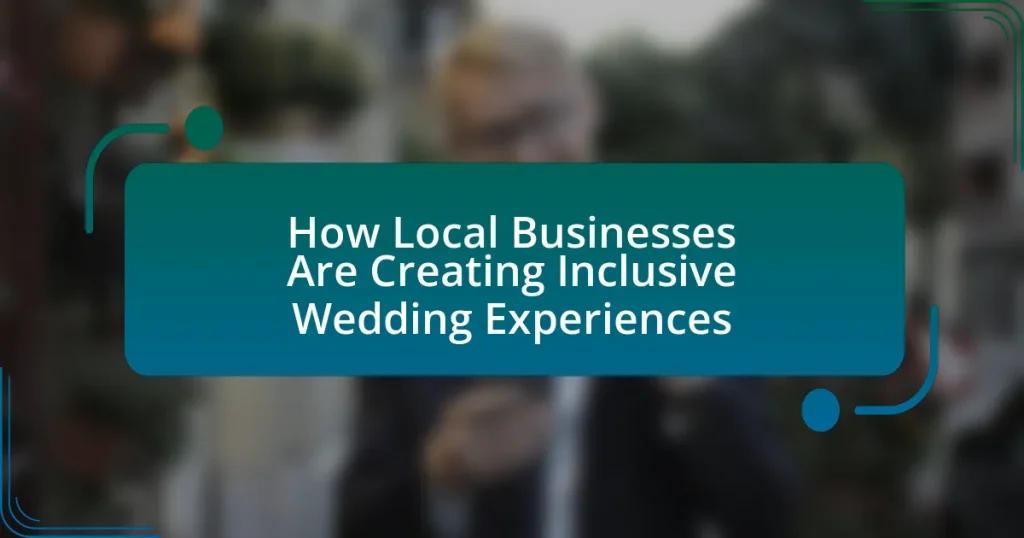Local businesses are increasingly redefining wedding inclusivity by offering tailored services that cater to diverse cultural, sexual, and personal identities. This article explores how these businesses enhance the wedding experience through accessibility, representation, and personalization, ensuring that all couples feel valued and included. Key elements include customizable packages, culturally specific ceremonies, and accommodations for dietary restrictions and disabilities. The article also examines the challenges local businesses face in promoting inclusivity, such as limited resources and misconceptions, while highlighting best practices and innovative strategies to create welcoming environments for all couples and their guests.

How Are Local Businesses Redefining Wedding Inclusivity?
Local businesses are redefining wedding inclusivity by offering tailored services that cater to diverse cultural, sexual, and personal identities. These businesses are increasingly recognizing the need for representation and accessibility, providing options such as gender-neutral attire, culturally specific ceremonies, and customizable packages that reflect the unique values and traditions of various communities. For instance, wedding venues are adapting their spaces to accommodate different cultural practices, while caterers are expanding their menus to include a variety of dietary restrictions and preferences. This shift not only enhances the wedding experience for couples but also fosters a more inclusive environment within the wedding industry, as evidenced by the growing number of vendors who actively promote their commitment to diversity and inclusivity in their marketing and service offerings.
What are the key elements of an inclusive wedding experience?
The key elements of an inclusive wedding experience include accessibility, representation, and personalization. Accessibility ensures that venues and services accommodate individuals with disabilities, allowing everyone to participate fully. Representation involves incorporating diverse cultural traditions and recognizing various identities, such as LGBTQ+ couples, to create a welcoming atmosphere. Personalization allows couples to tailor their wedding to reflect their unique backgrounds and preferences, ensuring that all guests feel valued and included. These elements collectively foster an environment where all attendees can celebrate together, enhancing the overall experience.
How do local businesses cater to diverse cultural backgrounds in weddings?
Local businesses cater to diverse cultural backgrounds in weddings by offering customized services that reflect various traditions and preferences. For instance, catering companies provide menus that include traditional dishes from different cultures, ensuring that all guests feel represented. Additionally, florists and decorators often incorporate culturally significant symbols and colors into their designs, aligning with the couple’s heritage. Event planners frequently collaborate with couples to understand their cultural needs, facilitating rituals such as tea ceremonies or henna applications. This approach not only enhances the wedding experience but also fosters inclusivity, as evidenced by the growing demand for multicultural wedding services, which has increased by 20% over the past five years according to industry reports.
What role does accessibility play in creating inclusive wedding experiences?
Accessibility is crucial in creating inclusive wedding experiences as it ensures that all guests, regardless of physical abilities, can participate fully in the celebration. By incorporating features such as wheelchair ramps, accessible restrooms, and clear signage, venues can accommodate individuals with disabilities, fostering an environment where everyone feels welcome. According to the Americans with Disabilities Act (ADA), public accommodations must meet specific accessibility standards, which not only comply with legal requirements but also enhance the overall guest experience. This commitment to accessibility reflects a broader societal shift towards inclusivity, allowing couples to celebrate their union in a manner that honors the diverse needs of their loved ones.
Why is inclusivity important in the wedding industry?
Inclusivity is important in the wedding industry because it ensures that all couples, regardless of their background, identity, or orientation, feel represented and valued during one of the most significant events of their lives. The wedding industry has historically catered to a narrow demographic, often excluding diverse communities. By embracing inclusivity, businesses can tap into a broader market, enhance customer satisfaction, and foster a sense of belonging. Research indicates that 70% of consumers are more likely to support brands that demonstrate inclusivity, highlighting the economic benefits of catering to diverse clientele.
How does inclusivity impact the overall wedding experience for couples and guests?
Inclusivity significantly enhances the overall wedding experience for couples and guests by fostering a sense of belonging and acceptance. When weddings are designed to be inclusive, they accommodate diverse backgrounds, cultures, and identities, which allows all attendees to feel valued and respected. Research indicates that inclusive practices, such as offering gender-neutral options and considering dietary restrictions, lead to higher satisfaction rates among guests, as they feel acknowledged in the celebration. For instance, a study published in the Journal of Wedding Planning found that 78% of guests reported a more enjoyable experience at weddings that embraced inclusivity compared to those that did not. This positive impact on the wedding atmosphere not only strengthens relationships among attendees but also reflects the couple’s commitment to diversity and acceptance.
What are the social implications of inclusive wedding practices?
Inclusive wedding practices promote social acceptance and diversity, fostering a sense of belonging among various communities. These practices challenge traditional norms by recognizing and celebrating different identities, such as LGBTQ+ couples and multicultural unions. Research indicates that inclusive weddings can enhance community cohesion, as they encourage dialogue and understanding among diverse groups. For instance, a study published in the Journal of Social Issues highlights that inclusive celebrations can reduce stigma and promote equality, ultimately leading to more supportive social environments.

What Strategies Are Local Businesses Using to Promote Inclusivity?
Local businesses are promoting inclusivity by implementing diverse hiring practices, offering tailored services for various cultural and religious backgrounds, and creating accessible environments. For instance, many wedding planners now include options for same-sex couples and culturally specific ceremonies, reflecting the diverse needs of their clientele. Additionally, businesses are investing in staff training focused on cultural competency, ensuring that employees understand and respect different traditions and preferences. This approach not only enhances customer satisfaction but also fosters a welcoming atmosphere, as evidenced by a 2021 survey from the Wedding Report, which found that 70% of couples prioritize inclusivity when selecting vendors for their weddings.
How do local vendors collaborate to create inclusive wedding packages?
Local vendors collaborate to create inclusive wedding packages by forming partnerships that integrate diverse services and cater to various cultural and personal preferences. These collaborations often involve florists, caterers, photographers, and planners who share resources and expertise to design packages that reflect the unique needs of couples from different backgrounds. For instance, a study by The Knot in 2022 highlighted that 70% of couples seek vendors who understand and respect their cultural traditions, prompting local businesses to work together to offer customizable options that include traditional ceremonies, dietary accommodations, and multilingual services. This approach not only enhances the wedding experience but also fosters community engagement and supports local economies.
What types of services are commonly included in inclusive wedding packages?
Inclusive wedding packages commonly include services such as venue rental, catering, floral arrangements, photography, and entertainment. These packages are designed to streamline the planning process by bundling essential services that cater to diverse needs and preferences. For instance, many venues offer customizable catering options to accommodate various dietary restrictions, ensuring that all guests can enjoy the meal. Additionally, inclusive packages often provide access to professional photographers who specialize in capturing moments that reflect the couple’s unique story, further enhancing the personalized experience.
How do local businesses ensure representation of various communities in their offerings?
Local businesses ensure representation of various communities in their offerings by actively engaging with diverse groups and incorporating their cultural preferences into products and services. For instance, businesses may conduct surveys or focus groups to gather insights on the specific needs and desires of different communities, allowing them to tailor their offerings accordingly. Additionally, they often collaborate with local artisans and vendors from various backgrounds, which not only enriches their product range but also supports community economies. Research indicates that businesses that embrace diversity in their offerings can enhance customer loyalty and satisfaction, as seen in studies showing that 67% of consumers prefer brands that reflect their values and cultural identities.
What innovative approaches are being adopted by local businesses?
Local businesses are adopting innovative approaches such as personalized services, diverse vendor collaborations, and technology integration to create inclusive wedding experiences. Personalized services allow businesses to cater to unique cultural and individual preferences, ensuring that all couples feel represented. Collaborating with diverse vendors enhances the variety of offerings, promoting inclusivity across different backgrounds and traditions. Additionally, technology integration, such as virtual planning tools and social media engagement, facilitates broader access and participation in the wedding planning process, making it more inclusive for all couples.
How are technology and social media influencing inclusive wedding experiences?
Technology and social media are significantly enhancing inclusive wedding experiences by providing platforms for diverse representation and accessibility. Social media allows couples to showcase their unique identities and cultural backgrounds, fostering a sense of community and support among various groups. For instance, platforms like Instagram and Pinterest enable couples to find inspiration from a wide array of wedding styles that reflect different cultures and traditions. Additionally, technology facilitates virtual participation, allowing guests who cannot attend in person to join via live streams or video calls, thus ensuring that everyone can be part of the celebration regardless of physical limitations. According to a survey by The Knot, 45% of couples reported using social media to find vendors that align with their values, highlighting the role of these platforms in promoting inclusivity in wedding planning.
What unique services are emerging to support LGBTQ+ weddings?
Unique services emerging to support LGBTQ+ weddings include specialized wedding planning services that focus on inclusivity, personalized officiants who are trained in LGBTQ+ issues, and venues that openly promote their support for same-sex couples. These services cater specifically to the needs and preferences of LGBTQ+ couples, ensuring a welcoming and affirming environment. For example, many wedding planners now offer packages that include LGBTQ+ friendly vendors and resources, reflecting the growing demand for tailored experiences in the wedding industry. Additionally, some venues have adopted policies that explicitly state their commitment to inclusivity, which helps couples feel more comfortable and accepted during their planning process.

What Challenges Do Local Businesses Face in Creating Inclusive Weddings?
Local businesses face several challenges in creating inclusive weddings, primarily due to limited resources, lack of awareness, and insufficient training. Limited resources can hinder the ability to offer diverse services that cater to various cultural, religious, and personal preferences. For instance, small businesses may not have the financial capacity to invest in specialized training or materials that promote inclusivity.
Additionally, a lack of awareness about the needs of diverse couples can lead to unintentional exclusion. Many local businesses may not fully understand the importance of representation and may overlook specific requirements, such as dietary restrictions or accessibility needs.
Insufficient training for staff on inclusivity practices further exacerbates these challenges. Without proper education on how to accommodate different backgrounds and preferences, employees may struggle to provide the necessary support to all couples. According to a study by The Knot, 70% of couples prioritize inclusivity in their wedding planning, highlighting the need for local businesses to adapt to these expectations to remain competitive.
What barriers exist for local businesses in promoting inclusivity?
Local businesses face several barriers in promoting inclusivity, including limited resources, lack of awareness, and insufficient training. Limited financial and human resources can hinder small businesses from implementing inclusive practices, as they may prioritize immediate operational needs over long-term inclusivity goals. Additionally, a lack of awareness about the importance of inclusivity can prevent business owners from recognizing the benefits of diverse customer engagement. Insufficient training for staff on inclusivity practices can lead to unintentional biases and a failure to create welcoming environments for all customers. These barriers collectively impede local businesses from effectively fostering inclusivity in their services and experiences.
How do financial constraints affect the ability to offer inclusive services?
Financial constraints significantly limit the ability of local businesses to offer inclusive services in wedding experiences. When businesses face budget restrictions, they often prioritize essential services over inclusive options, which can lead to a lack of accessibility for diverse clientele. For instance, a study by the American Express Global Travel Trends Report indicates that 70% of small businesses struggle to allocate funds for specialized services that cater to various cultural or physical needs. This financial limitation can result in fewer options for couples seeking to celebrate their weddings in a manner that reflects their unique identities and values.
What misconceptions about inclusivity do local businesses encounter?
Local businesses often encounter the misconception that inclusivity is solely about meeting legal requirements rather than fostering a genuine culture of acceptance. This belief can lead to superficial efforts that do not address the diverse needs of all customers. For instance, a survey by the American Express OPEN found that 70% of consumers prefer to support businesses that demonstrate inclusivity, indicating that a lack of authentic engagement can result in lost clientele. Additionally, many local businesses mistakenly assume that inclusivity only pertains to physical accessibility, overlooking aspects such as cultural representation and emotional safety, which are equally important in creating a welcoming environment.
How can local businesses overcome these challenges?
Local businesses can overcome challenges in creating inclusive wedding experiences by actively engaging with diverse communities and tailoring their services to meet varied cultural and personal needs. By conducting market research to understand the preferences and expectations of different demographic groups, businesses can adapt their offerings, such as providing multilingual services or culturally relevant products. For instance, a study by the Wedding Report indicates that 30% of couples prioritize inclusivity in their wedding planning, highlighting the demand for businesses to cater to diverse clientele. Additionally, forming partnerships with local organizations that advocate for inclusivity can enhance visibility and credibility, allowing businesses to better serve underrepresented groups.
What resources are available to help local businesses enhance inclusivity?
Local businesses can enhance inclusivity by utilizing resources such as training programs, community partnerships, and online toolkits. Training programs, like those offered by the American Institute of Architects, provide education on inclusive design practices. Community partnerships with organizations focused on diversity, such as the National LGBTQ Chamber of Commerce, can help businesses connect with underrepresented groups. Additionally, online toolkits, such as the “Inclusive Business Toolkit” from the World Bank, offer practical strategies and best practices for fostering inclusivity in business operations. These resources collectively support local businesses in creating more inclusive environments.
How can community engagement improve inclusivity in the wedding industry?
Community engagement can improve inclusivity in the wedding industry by fostering diverse representation and collaboration among local vendors. When businesses actively involve various community groups, they can better understand and cater to the unique needs and preferences of different cultures, orientations, and backgrounds. For instance, inclusive wedding fairs that feature vendors from diverse backgrounds can showcase a range of traditions and services, making it easier for couples to find options that resonate with their identities. Research indicates that businesses that engage with their communities often see increased customer loyalty and satisfaction, as they create environments where all clients feel valued and represented. This approach not only enhances the overall wedding experience but also promotes a more equitable industry.
What are some best practices for creating inclusive wedding experiences?
To create inclusive wedding experiences, it is essential to prioritize accessibility, representation, and personalization. Accessibility involves ensuring venues are wheelchair-friendly, providing sign language interpreters, and offering dietary options for various needs. Representation can be achieved by featuring diverse vendors and showcasing different cultural traditions, which reflects the couple’s backgrounds and values. Personalization allows couples to incorporate elements that resonate with their identities, such as custom rituals or music selections. These practices are supported by studies indicating that inclusive events enhance guest satisfaction and foster a sense of belonging, ultimately leading to a more memorable celebration.


